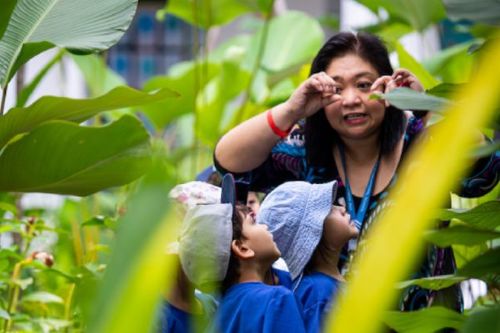The shapes and patterns of foliage, counting the types of flowers in the garden, or observing angles that can be found in nature – numeracy is never dull in the outdoor classroom. And while it’s true that nature holds valuable Maths-related lessons for children, the subject also becomes stimulating simply by conducting hands-on activities outdoors. The change of scene from studying indoors works wonders for reinforcing Maths concepts and creating a love for the subject.
The Benefits of Outdoor Learning in Schools
Outdoor learning is a key component for children enrolled at One World International School. In fact, it’s part of what makes us a leading international school in Singapore. Students and parents find value in our non-traditional classrooms, open-air learning spaces and outdoor activities.
Being outdoors in a beautifully landscaped space is inspiring. It gives students room to move and stretch. And the fresh air and sunshine awaken the mind and boost the spirit. Outdoor learning is an enjoyable way to separate segments of time throughout the school day. It invigorates and replenishes both mind and body, and our students find it motivating and intriguing. At OWIS, we place solid value on outdoor Maths activities for several important reasons.
Why We Believe in Setting Aside Time to Teach Maths Outdoors

Moving the Maths classroom outside gives children a bit of a break in what might otherwise feel like a long school day. There are many benefits to this, including:
- Children can explore mathematical concepts in the real world instead of just inside the classroom.
- The great outdoors is more accommodating of equipment and supplies, allowing children to explore concepts on a much grander scale.
- Outdoor Maths can be motivating, promoting a natural curiosity among children.
- The outdoor arena provides more opportunity for play-based learning, a concept that’s especially impactful for early learners.
- Learning outside the classroom supports the development of healthy and active lifestyles by offering children opportunities for physical activity, freedom and movement, and promoting a sense of well-being.
- It enables children to explore their curiosity, develop team-building skills, and gives them a great sense of independence. Students make useful links in their learning, and this encourages exploration and risk-taking.
How OWIS Conducts Outdoor Maths Activities to Encourage Learning

- Using media such as chalk, dirt, mud or sticks to mark areas for measuring
- Studying direction and position on a grander scale than possible inside the classroom
- Using the outdoor environment to work out word problems, such as finding which colour of cars in the parking lot is the most popular or finding the ratio of blue cars to white cars.
- Teaching shapes and measurement outside, where students can build dens or forts to required specifications
Recent Maths-related outdoor learning activities at OWIS included our lesson on building three-dimensional shapes. Children used straws and connectors to recreate their own ancient civilisation building structure, which connected to the past. This linked nicely with a unit of inquiry and allowed students to develop their critical thinking and creative skills. This open-ended task was completed in an informal setting, guided by their 5th-grade teacher.
A second project took OWIS Primary learners to our outside lawn, where they planned and marked out garden plots, using string and pegs to create intriguing shapes, such as triangles, rectangles and circles. Children not only learned more about measurement and geometry, but this project tied into gardening as well.
Outdoor Learning Ideas for Parents
There is much you can do as a parent to help your child practice Maths outdoors. One World International School encourages parent participation at every level. For this reason, our teachers recommend the following activities:
- Conducting a scavenger hunt for shapes
- Using even- and odd-numbered bags for an impromptu bean bag toss
- Buying a deck of playing cards and playing a Maths game outside
- Playing hopscotch or other number-related active games
- Playing a number line race using outdoor chalk
- Creating a “life-size” hundreds chart
- Measuring objects in nature
- Using tree trunks to explore concepts such as circles, radius, circumference and perimeter
If your family is interested in learning more about our private primary school campuses in Singapore, where we believe in the benefits of experiential and outdoor learning, reach out to schedule a virtual tour today.















